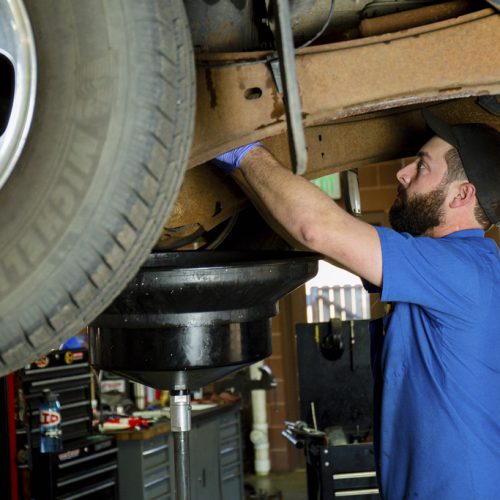When Is It Time to Take Your Car or Truck in for An Oil Change?
 We get a lot of questions about how often you should get an oil change for your vehicle and what kind of oil (conventional vs. synthetic) is best. Since there can be a big discrepancy between manufacturers recommendations and best practices for your vehicle, how do you know? I went to the experts…the technicians at our shops…and asked them what they use in their own personal vehicles and how often they change their oil.
We get a lot of questions about how often you should get an oil change for your vehicle and what kind of oil (conventional vs. synthetic) is best. Since there can be a big discrepancy between manufacturers recommendations and best practices for your vehicle, how do you know? I went to the experts…the technicians at our shops…and asked them what they use in their own personal vehicles and how often they change their oil.
What Do the Experts Say About Oil Changes?
Across the board, our technicians change the oil in their own vehicles every 3-5,000 miles. See below:
- Joe changes the oil in his F150 with 185,000 miles every 3,000 miles and uses our conventional oil (which is actually a synthetic blend). Joe notes that he likes to see that the used oil he drains after 3,000 miles is a dark gold, but not “black” oil that he often sees in customer’s vehicles that have gone longer between oil changes. However, he uses a full synthetic oil in his Hyundai Tiburon, which is a sporty performance car. Even with synthetic oil, he changes the oil every 3,000 miles just to be safe.
- Dylan changes the oil in his 1990’s Jeeps every 3,000 miles and uses conventional oil. However, he uses a synthetic oil in his wife’s 1999 Jeep every 4,000 miles, because he prefers to extend the oil change interval a little. He notes that the oil filters used with synthetic oils actually filter less so they don’t get clogged with long periods between oil changes.
- Austin, who describes himself as “super picky” and wants his truck to last a loooong time, changes the synthetic oil in his Tacoma truck every 3,000 miles.
- Roy changes his oil every 5,000 miles and uses conventional oil in his Ford Truck.
- Paul changes his oil every 3,500 miles religiously and uses conventional oil on his MDX and Honda Ridgeline. He notes that in his 01 Acura MDX with 190,000 miles, he has never had to replace even one engine seal. He sees some MDX’s with significantly less mileage with several leak, simply because of the infrequent oil change frequency.
- Dan uses synthetic oil every 5,000 miles in his Chevy truck.
- Ted changes his oil every 4-5,000 miles, whether he uses conventional (Toyota truck) or synthetic oil (Trailblazer and Lexus).
- Dean changes his 160,000-mile Honda Accord every 5,000 miles, using conventional oil.
- Justin, with a Subaru WRX Turbo which requires synthetic oil, changes the oil every 5,000 miles.
- Bola uses synthetic in his Honda Ridgeline, changing it approximately every 5,000 miles.
- Max uses synthetic oil every 5,000 miles in all his vehicles (BMW with 265,000 miles, Expedition with 198,000 miles, and 1999 F250 with a mere 115,000 miles!).
- Tim uses conventional oil every 3,000 miles in his 2002 Infiniti.
- Luis changes his oil every 4,000 miles with conventional oil in his 2004 Honda Element with 267,000 miles.
- Jon uses synthetic oil in his Volvo and Chevy Astro, and changes his oil every 4,000 miles.
The common thread that I heard from the technicians is that is changing your oil more frequently adds longevity to your car, and is the best insurance against normal wear and tear. Most of us want our car or truck to be reliable and safe for a long time and many miles, until we chose to make a change and get a new/used vehicle. No one wants to feel forced to get a different vehicle because the one we have is having too many problems or simply broken down.
Your Vehicle Owner’s Manual is your reference for the recommended oil change interval and type of oil recommended for your vehicle. Pay attention to the maintenance schedule for Severe vs. Normal Driving Conditions, because that changes the recommended frequency of oil changes. Because we live in the mountainous Colorado Springs area, that alone puts us under the Severe Driving Conditions maintenance schedule. Other factors that put your vehicle in the Severe driving condition category include sustained stop-and-go trips (city driving), frequent short trips (under 5 miles), extremely hot, cold or dusty climate, or towing/carrying heavy loads.
What we do not recommend is the extended intervals between an oil change that are sometimes advised with synthetic oils, such as 10-15,000 miles. When purchasing a vehicle, these recommendations reduce the “cost of ownership” on the MSRP, so it looks good to a potential buyer. However, besides the downside of keeping oil in a vehicle for too long, other potential problems (leaks, failing parts, etc.) can be missed and cause engine damage before they are caught.
Why is oil important for your car or truck’s engine?
Engines generate a significant amount of heat, resulting from the chemical reaction of gasoline combustion and from the friction generated between moving parts. Engine oil dissipates the heat, lubricates, and cleans all the moving parts of a vehicle’s engine. Oil also helps to preserve the many seals (valve cover and guide seals, cam seals, and crank seals) that keep fluids in the particular system where they do their work.
Over time, heat, dirt, dust and debris break down the oil and the oil will lose its protective properties. Think of oil as a bunch of microscopic “marbles”. With time and heat, those “marbles” become roughened like sand pebbles, therefore reducing the sliding properties that reduce the friction of parts moving against one another. Dirt, dust and debris also collect in the oil, decreasing the lubricating properties significantly.
What Is The Difference Between Synthetic Oil and Conventional Oil and Is Synthetic Oil Worth The Extra Cost?
Both conventional and synthetic oils have a petroleum oil base, but synthetic oils have several chemical additives that improve their ability to withstand high engine temperatures and to resist breakdown (i.e. last longer). These days, conventional oils also have additives and the “regular” oil we use routinely in our shop is actually a synthetic blend.
However, older vehicles are more susceptible to wear and tear because of the materials used and manufacturer’s tolerances were not as precise. Changing the oil every 3,000 miles is beneficial in extending the life of that vehicle. Changing the oil more frequently is the best insurance against running too low on oil, leading to catastrophic engine failure. At Honest Accurate Auto Service, we advise you when leaks are starting, when they are getting worse, and when they actually require repairs.
Changing your oil frequently is the cheapest insurance to keeping your engine running safely and reliably. Engine failure can, and does, occur when you run your engine out of or low on oil. An engine replacement is the only solution when that happens. So, having an oil change 3-4 times a year is a lot less expensive than a $4-7,000 engine replacement. When you think about it, one or two extra oil changes per year is cheap insurance against the long term abuse our harsh Colorado weather and terrain can throw at your vehicle.
Our technicians at Honest Accurate Auto Service are a wealth of information! We encourage our customers to talk to our Service Advisors and technicians to discuss what is best for the vehicle you drive. Guidelines for intervals between oil changes can be different for each vehicle, especially dependent on age and make/model of your vehicle. Those of you who drive long distances vs. city driving, drive steep grades and/or dusty, dirty roads, or if you tow a trailer or RV may have special considerations.
Let Honest Accurate Auto Service in Colorado Springs help you keep your car running for as long you want to keep your car – regularly scheduled oil changes will help you toward that end. Thank you to all of our loyal customers for doing just that!!




